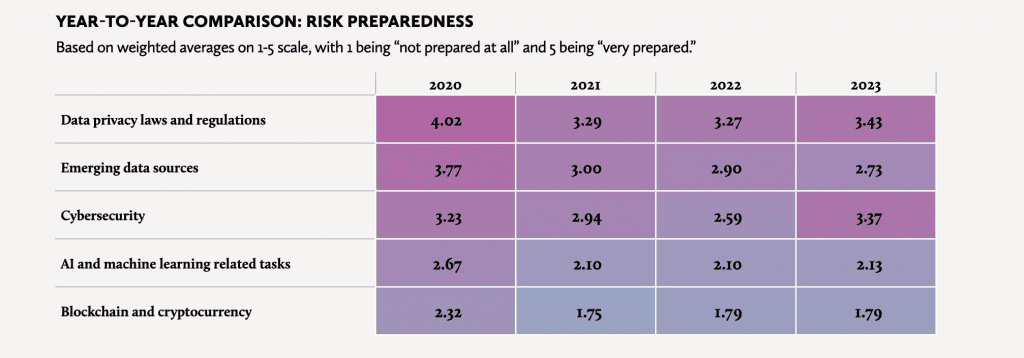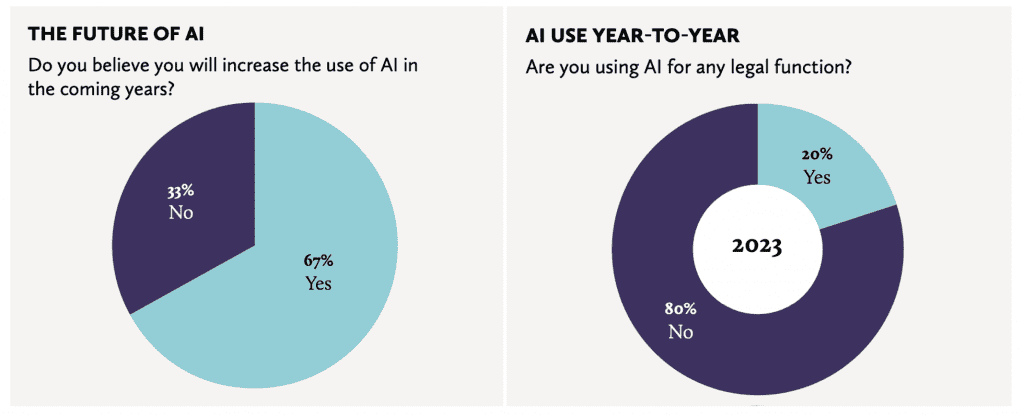Given the evolving nature and growth of technology, 73 percent of in-house lawyers in a recent survey highlighted “risks relating to artificial intelligence (‘AI’) and other advanced tools, including the use of unsanctioned AI-based applications,” as a key threat for which most companies are not prepared. According to FTI Consulting’s 2023 General Counsel Report, which is based on findings from a survey of chief legal officers across a range of industries and geographies, the majority of survey participants (57 percent) stated that when it comes to their “readiness” for dealing with AI technologies and corresponding issues, they are “minimally prepared,” with just 3 percent saying that they are “moderately prepared.”
“It is not in our business DNA to deal with AI and other advanced technologies; it is hard to be prepared if you cannot anticipate the challenges,” one chief legal officer said. “We have not figured out how to address [the onslaught of AI] because we are not familiar enough with the emerging technology and the development is far ahead of any regulation,” another told the Washington, DC-based consultancy in connection with the survey.

What Risk Looks Like: One area where in-house attorneys seem to be very much in agreement is that there are critical risks coming by way of emerging data sources – from collaboration platforms and cloud file-sharing tools to presumably, generative AI platforms like ChatGPT – and the use of “shadow AI” or AI-based applications not known or sanctioned by the IT department. Case in point: 56.67 percent of respondents said that they are concerned about the impact of unsanctioned uses of emerging data sources within their organizations. If this sounds familiar … it comes as companies like Apple and JP Morgan Chase have expressed concerns about employees accidentally leaking confidential information as a result of their use of generative AI platforms, and at least two lawyers have been sanctioned in connection with their use of ChatGPT to draft – and submit to the court – a brief that included six fictitious case citations.
Despite the risks and corresponding “uncertainty” around AI, 20 percent of survey respondents said that their departments are currently using some type of AI for a “legal function.” Interestingly, this is actually down from 27 percent in connection with FTI’s 2022 survey and 33 percent in 2021. (It is worth noting that at least some organizations/individuals are likely making use of AI without even knowing it; a 2021 HubSpot survey revealed that 63 percent of respondents were unaware that they were using AI technologies.)
Current and Future Use Cases
To date, much of the use of AI in the legal field comes with “a specific focus on either contracts, e-discovery or privacy,” per FTI. At the same time, FTI found that the implementation of AI in many legal departments is aimed at automating relativelyrudimentary tasks and not at replacing existing practitioners. “A number of the enterprise-wide programs that we have implemented over the past three to five years have focused on freeing people to focus on more substantive work and reducing the need for administrative support,” one respondent said. Others echoed this sentiment, saying that they are using “preliminary and primitive AI to extract key terms in our contract management system” and to “find personally-identifiable information that we may not have mapped.” Another noted, “We have changed how we ticket legal and compliance requests [and] gotten better at thinking about how to automate legal tasks.”
While there is some agreement that it is only a matter of time before companies and firms begin expanding their use of AI beyond more menial tasks like document review, one respondent stated that companies will “still need a human to offer judgment and wisdom, as you cannot have a machine do everything.”

Still yet, respondents noted that prospective uses of AI could be helpful in light of the influx of data that legal teams now have on hand. “We are a data-driven legal team and validate our decisions based on data, so we expect our use of AI to increase,” said one of the lawyers surveyed. Another stated, “We have more data in the law department than we ever had before, so we are developing a data lake with algorithms; we are also partnering with law firms to access and expand that data lake.”
Looking ahead, FTI found that “there appears to be a more engaged conversation about future use,” with 57 percent of respondents revealing that they expect to increase their use of AI over the next few years. In terms of future use cases, respondents cited “vendor management and contract creation, as well as an escalation [in] the areas in which they are already using it” as key examples of applicability.
There is skepticism, of course, with some attorneys stating that the meaningful adoption of AI might not occur as “quickly or seamlessly” as they would like. “We are not standardized enough to apply AI or advanced tools to our legal work; also, the programs that I have seen have not appeared to be valuable enough to make an investment,” one general counsel said. But there are also optimistic leaders. In one of the more optimistic outlooks, one chief legal officer predicted, “In the next five years, the world will look very different, with greater automation, and legal departments will be more like business advisors and much less like contract drafters.” Another said that deploying AI for things contract management and e-discovery is “exactly the type of strategy that will increase the professional quality of life in our legal department,” and as a result, “we will continue to identify use cases.”














